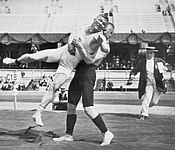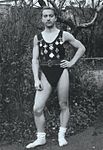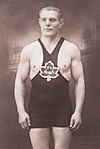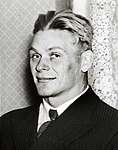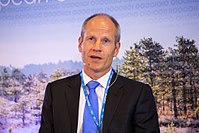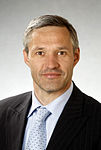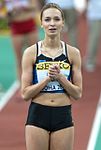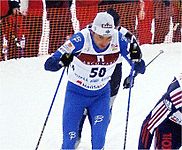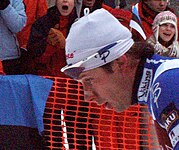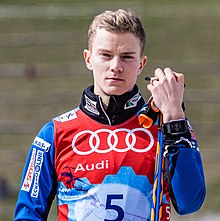Olympic history of Estonia
|
|
|
|
|---|---|---|
| 13 | 11 | 17th |
Estonia's NOK , the Eesti Olümpiakomitee , was founded in 1923 and recognized by the IOC in 1924 . Estonia took part in the Olympic Games from 1920 to 1936. In 1912, eleven Estonian athletes competed for the Russian Empire. From 1952 to 1988, Estonian athletes competed for the Soviet Olympic team. Since 1992, Estonia has been competing with its own Olympic team again. In 1928 and 1936, Estonian winter sports enthusiasts took part in winter games. Estonian winter sports enthusiasts are only represented again with their own Estonian Olympic team. Young athletes have taken part in all of the youth games held so far in summer and winter.
venue
During the 1980 Summer Olympics in Moscow , the Estonian capital Tallinn was the venue for the sailing competitions .
History of participation
Summer games
The first Estonian to take part in the Olympic Games was the marksman Teotan Lebedew on June 29, 1912. Ten other athletes took part in Stockholm as members of the Russian team. The wrestler Martin Klein won silver in the middleweight division of the Greco-Roman style, making him the first Estonian to win an Olympic medal. Klein's fight against the Finn Alfred Asikainen lasted eleven hours and 40 minutes and was only over in the late evening after a decision by the judges. Klein renounced a fight for gold the next day against the Swede Claes Johansson . The sailor Ernst Brasche won a bronze medal as a member of the boat Gallia II in the 10-meter class. The rower Mart Kuusik also won bronze in the single.
The walker Eduard Hermann
An Estonian Olympic team started for the first time in Antwerp in 1920. 14 men competed in athletics, weightlifting and wrestling. Boxers and footballers (from 1924), sailors (from 1928), rowers, swimmers and basketball players (from 1936), shooting, archery, canoeing, cycling, judo, fencing, modern pentathlon and table tennis (from 1992), took part in the following summer games, Beach volleyball (from 1996), tennis and triathlon (from 2004) as well as badminton and gymnastics (from 2008).
The first Estonian to represent his country at the Olympic Games was middle-distance runner Johannes Villemson on August 15, 1920. In the marathon, on August 22nd , Jüri Lossmann won the first medal for Estonia with silver. On August 29, Alfred Schmidt also won silver in the weightlifting featherweight division. On the same day, Alfred Neuland became the first lightweight Olympic champion in Estonian history. Aleksander Klumberg achieved further top placements in athletics with 5th place in the javelin and Harald Tammer with 6th place in the shot put.
Tammer also competed in weightlifting in 1924 and was able to win bronze in the heavyweight division. In the middleweight division, Alfred Neuland took silver and Jaan Kikas bronze. In Greco-Roman wrestling, Eduard Pütsep was Olympic champion in the bantamweight division, while Roman Steinberg won bronze in the middleweight division . Albert Kusnets reached fourth place in the lightweight. Aleksander Klumberg won bronze in the decathlon.
In 1928 it was the wrestlers who won gold medals. In the Greco-Roman style, Voldemar Väli won the featherweight division, Albert Kusnets won bronze in the middleweight division. In freestyle, Osvald Käpp became the lightweight Olympic champion. Arnold Luhaäär won silver in heavyweight lifting . The Estonian boat Tutti V sailed to bronze in the 6 meter class. In 1932 in Los Angeles only two athletes from Estonia took part, a wrestler and a track and field athlete.
As in 1928, the gold medals went to the wrestlers in Berlin in 1936. Here the heavyweight Kristjan Palusalu could become Olympic champion in both styles. The light heavyweight August Neo also won medals in both styles. He won silver in freestyle and bronze in Greco-Roman style. Voldemar Väli also won bronze in the lightweight. In the welterweight division, Edgar Puusepp took fourth place. In boxing, Nikolai Stepulow won silver in the lightweight. Arnol Luhaäär took bronze in the heavyweight lifting category.
From 1952 onwards, Estonian athletes participated as members of the Soviet Olympic teams. After the collapse of the Soviet Union in 1991, Estonia regained independence and from then on again took part in the Olympic Games with its own team. In Barcelona, Estonian women athletes competed for the first time at the summer games. The first women in the country to take part in the summer games were the sailor Krista Kruuv and the marksman Inna Rose on July 27, 1992 . The first ever medal for a woman, at the same time the first Olympic victory for a woman, went to the cyclist Erika Salumäe , who won the sprint. Salumäe had already won the gold medal in this discipline for the Soviet Union in 1988. The twin brothers Tõnu and Toomas Tõniste won the bronze medal in sailing with the 470. In athletics, hammer thrower Jüri Tamm took fifth place. Fencer Kaido Kaaberma achieved fourth place in the individual ranking with the sword. The men's double sculls also took fourth place in rowing. In the one, Jüri Jaanson came fifth.
In 1996 the Estonian athletes were without medals. The decathlete Erki Nool took 6th place. Erika Salumäe achieved the same position in the bike sprint. In fencing, both epee teams took fifth place. In the individual, Kaido Baaberma reached seventh place. The modern pentathlete Imre Tiidemann also came in seventh, as did Andrei Ineschin in skeet shooting. Medal wins could not be celebrated again until 2000 in Sydney. Erki Nool became Olympic champion in the decathlon. In judo, Aleksei Budõlin won bronze in the light middleweight division and Indrek Pertelson in the heavyweight division. In rowing, Jüri Jaanson was sixth in the single. In Greco-Roman wrestling, Valeri Nikitin took fourth place in the welterweight division.
In 2004 in Athens Indrek Pertelson repeated his bronze medal in judo heavyweight. The rower Jüri Jaanson won silver in the single, the double scull was fourth. Aleksander Tammert took bronze in the discus throw after the original winner, the Hungarian Róbert Fazekas , was disqualified for doping. Andrus Värnik took 6th place in the javelin throw .
In Beijing 2008 Gerd Kanter became Olympic champion in the discus throw. The double scull won silver in rowing. Kanter won the bronze medal again in London in 2012. Wrestler Heiki Nabi won silver in the Greco-Roman style super heavyweight. In rowing, the double quad reached fourth place. In 2016, the double quad ensured Estonia's only medal win in Rio de Janeiro. In athletics, Rasmus Mägi was sixth in the 400 meter hurdles. In the discus throw, Martin Kupper took 4th place and Gerd Kanter 5th place. In the women's category, the long jumper Ksenija Balta took 6th place. In fencing, the women's sword team took 4th place. Weightlifter Mart Seim was seventh in the super heavyweight division. Heiki Nabi finished 5th in the Greco-Roman wrestling in the super heavyweight division.
Winter games
The first winter sports enthusiasts took part in speed skating in St. Moritz in 1928. At the winter games, Estonian athletes subsequently competed in cross-country skiing, figure skating and alpine skiing (from 1936), biathlon and Nordic combined (from 1992), tobogganing (from 1994) and ski jumping (from 2002). On February 7, 1936, the ski racer Karin Peckert-Forsmann was the first ever woman to compete in the Olympic Games.
Combined Allar Levandi achieved his first top placement in 1992 with 6th place in the individual ranking. In 1994 he was fourth with the team. In the individual ranking, Ago Markvardt took 5th place. In 1998, cross-country skier Jaak Mae was sixth over 10 kilometers in the classic style. His compatriot Andrus Veerpalu came in eighth.
In 2002 the first medals were won at the Winter Games. Andrus Veerpalu became the first Estonian medalist and Olympic champion at the Winter Games with his victory over 15 kilometers in classic style. Jaak Mae also won bronze in this race. Veerpalu won classic silver over 50 kilometers. In the women’s category , Kristina Šmigun-Vähi took 7th place in both the mass start and the classic 30 km.
In 2006 in Turin there were three Olympic victories in cross-country skiing. Kristina Šmigun-Vähi won over 10 kilometers classic and in the pursuit. Andrus Veerpalu won again over 15 kilometers classic. Jaak Mae finished fifth. In 2010 Kristina Šmigun-Vähi won another silver medal over 10 kilometers in free style. Andrus Veerpalu took 6th place over 50 kilometers.
It wasn't until 2018 in Pyeongchang that there was another top placement. The speed skater Saskia Alusalu came fourth in the mass start.
Youth games
Eight teenage athletes, four boys and four girls, took part in the first 2010 Singapore Summer Youth Games . The participants competed in athletics, judo, rowing, sailing and swimming. The long jumper Kaia Soosaar delivered the best result with 4th place.
In 2014 in Nanjing , 17 young people, seven boys and ten girls, competed in athletics, badminton, basketball, cycling, judo, sailing and swimming. The best results were achieved this time by the shot putter Kert Piirimäe with 5th place and the swimmer Daniel Zaitsev with 7th place over 50 meters butterfly. The girls' basketball team finished fourth in the group stage. They lost to the German team at 14:17.
At the first Winter Youth Games in Innsbruck in 2012, 17 young people, nine boys and eight girls, took part. They competed in the sports of biathlon, cross-country skiing, alpine skiing, curling, figure skating, Nordic combined and ski jumping. With two silver medals, the biathlete Rene Zahkna was the most successful Estonian participant. He won the medals in the sprint and in the pursuit. In cross-country skiing, Andreas Veerpalu , the son of Olympic champion Andrus Veerpalu, was eighth over 10 kilometers classic. Also with the mixed relay he reached 8th place. The Estonian curling team took the last place in the group. Against Switzerland they lost 1:12. Figure skater Sindra Kriisa finished fourth with the mixed team. In the Nordic Combined, Kritjan Ilves took 7th place in the individual ranking.
Also in 2016 in Lillehammer 17 young people took part, this time ten boys and seven girls. They competed in the sports of biathlon, cross-country skiing, alpine skiing, curling, figure skating, Nordic combined, speed skating and ski jumping. The biathlete Robert Heldna took 5th place in the sprint and thus ensured the best result.
Overview of the participants
Summer games
| year | Athletes | Flag bearer | sports | Medals | |||||||||||||||||||||||||||
|---|---|---|---|---|---|---|---|---|---|---|---|---|---|---|---|---|---|---|---|---|---|---|---|---|---|---|---|---|---|---|---|
| total | m | w |
|
|
|
|
|
|
|
|
|
|
|
|
|
|
|
|
|
|
|
|
|
|
|
|
|
total | rank | ||
| 1896-1908 | not participated | ||||||||||||||||||||||||||||||
| 1912 | Participation in the Olympic team of the Russian Empire | ||||||||||||||||||||||||||||||
| 1920 | 14th | 14th | 0 | Harald Tammer | 7th | 3 | 4th | 1 | 2 | 3 | 14th | ||||||||||||||||||||
| 1924 | 37 | 37 | 0 | Jüri Lossmann | 10 | 8th | 7th | 1 | 11 | 1 | 1 | 4th | 6th | 17th | |||||||||||||||||
| 1928 | 20th | 20th | 0 | Gustav Kalkun | 4th | 4th | 6th | 1 | 5 | 2 | 1 | 2 | 5 | 16 | |||||||||||||||||
| 1932 | 2 | 2 | 0 | Osvald Käpp | 1 | 1 | |||||||||||||||||||||||||
| 1936 | 33 | 33 | 0 | Erich Altosaar | 7th | 4th | 8th | 2 | 1 | 1 | 2 | 8th | 2 | 2 | 3 | 7th | 13 | ||||||||||||||
| 1948-1988 | Participation in the Olympic teams of the former Soviet Union | ||||||||||||||||||||||||||||||
| 1992 | 37 | 33 | 4th | Heino Lipp | 5 | 4th | 4th | 7th | 4th | 3 | 1 | 1 | 3 | 1 | 2 | 1 | 1 | 1 | 1 | 2 | 34 | ||||||||||
| 1996 | 43 | 35 | 8th | Jüri Jaanson | 12 | 4th | 4th | 1 | 1 | 2 | 1 | 1 | 7th | 1 | 6th | 1 | 2 | ||||||||||||||
| 2000 | 33 | 31 | 2 | Tõnu Tõniste | 5 | 3 | 4th | 3 | 4th | 1 | 1 | 5 | 2 | 4th | 1 | 1 | 2 | 3 | 47 | ||||||||||||
| 2004 | 42 | 31 | 11 | Erki Nool | 15th | 1 | 1 | 7th | 6th | 1 | 6th | 2 | 2 | 1 | 1 | 2 | 3 | 64 | |||||||||||||
| 2008 | 47 | 34 | 13 | Martin Padar | 14th | 2 | 7th | 9 | 1 | 4th | 1 | 1 | 2 | 2 | 1 | 2 | 1 | 1 | 1 | 2 | 46 | ||||||||||
| 2012 | 32 | 23 | 9 | Aleksander Tammert | 10 | 2 | 5 | 6th | 2 | 1 | 1 | 2 | 1 | 1 | 1 | 1 | 1 | 2 | 63 | ||||||||||||
| 2016 | 46 | 28 | 18th | Karl-Martin Rammo | 18th | 1 | 5 | 5 | 4th | 2 | 1 | 1 | 2 | 1 | 5 | 1 | 2 | 1 | 1 | 78 | |||||||||||
| total | 9 | 9 | 16 | 34 | 52 | ||||||||||||||||||||||||||
Winter games
| year | Athletes | Flag bearer | sports | Medals | |||||||||||||
|---|---|---|---|---|---|---|---|---|---|---|---|---|---|---|---|---|---|
| total | m | w |
|
|
|
|
|
|
|
|
|
|
|
total | rank | ||
| 1924 | not participated | ||||||||||||||||
| 1928 | 2 | 2 | 0 | Eduard Hiiop | 2 | ||||||||||||
| 1932 | not participated | ||||||||||||||||
| 1936 | 5 | 3 | 2 | Johannes Rosenfeld | 1 | 2 | 1 | 1 | |||||||||
| 1948-1988 | Participation in the Olympic teams of the former Soviet Union | ||||||||||||||||
| 1992 | 19th | 14th | 5 | Ants Antson | 1 | 6th | 8th | 4th | |||||||||
| 1994 | 26th | 17th | 9 | Allar Levandi | 1 | 10 | 1 | 9 | 4th | 1 | |||||||
| 1998 | 20th | 15th | 5 | Kalju Ojaste | 1 | 9 | 4th | 4th | 2 | ||||||||
| 2002 | 17th | 14th | 3 | Allar Levandi | 1 | 10 | 4th | 2 | 3 | 1 | 1 | 1 | 3 | 17th | |||
| 2006 | 26th | 17th | 9 | Eveli Saue | 3 | 12 | 2 | 6th | 1 | 2 | 3 | 3 | 12 | ||||
| 2010 | 30th | 18th | 12 | Roland Lessing | 5 | 14th | 2 | 9 | 1 | 1 | 25th | ||||||
| 2014 | 25th | 18th | 7th | Indrek Tobreluts | 2 | 7th | 2 | 9 | 3 | 2 | |||||||
| 2018 | 22nd | 17th | 5 | Saskia Alusalu | 2 | 6th | 2 | 6th | 2 | 3 | |||||||
| total | 4th | 2 | 1 | 7th | 27 | ||||||||||||
List of medal winners
Summer games
Gold medals
| Surname | Games | sport | discipline | annotation |
|---|---|---|---|---|
| Alfred new territory | 1920 Antwerp | Weightlifting | lightweight | first Olympic victory at summer games |
| Eduard Pütsep | 1924 Paris | Wrestling | Bantamweight, Greco-Roman | |
| Voldemar Väli | 1928 Amsterdam | Wrestling | Featherweight, Greco-Roman | |
| Osvald Käpp | 1928 Amsterdam | Wrestling | Lightweight, freestyle | |
| Kristjan Palusalu | 1936 Berlin | Wrestling | Heavyweight, Greco-Roman | |
| Kristjan Palusalu | 1936 Berlin | Wrestling | Heavyweight, freestyle | |
| Erika Salumäe | 1992 Barcelona | Cycling | sprint | |
| Erki Nool | 2000 Sydney | athletics | Decathlon | |
| Gerd Kanter | 2008 Beijing | athletics | Discus throw |
Silver medals
| Surname | Games | sport | discipline | annotation |
|---|---|---|---|---|
| Jüri Lossmann | 1920 Antwerp | athletics | marathon | first medal win at summer games |
| Alfred Schmidt | 1920 Antwerp | Weightlifting | Featherweight | |
| Alfred new territory | 1924 Paris | Weightlifting | medium weight | |
| Arnold Luhaäär | 1928 Amsterdam | Weightlifting | Heavyweight | |
| August Neo | 1936 Berlin | Wrestling | Light heavyweight, freestyle | |
| Nikolai Stepulov | 1936 Berlin | Boxing | lightweight | |
| Jüri Jaanson | 2004 Athens | rowing | One | |
|
Tõnu Endrekson Leonid Gulov |
2008 Beijing | rowing | Double scull | |
| Heiki Nabi | 2012 London | Wrestling | Super heavyweight, Greco-Roman |
Bronze medals
Winter games
Gold medals
| Surname | Games | sport | discipline | annotation |
|---|---|---|---|---|
| Andrus Veerpalu | 2002 Salt Lake City | Cross-country skiing | 15 kilometers classic | first medal win and Olympic victory at winter games |
| Andrus Veerpalu | 2006 Turin | Cross-country skiing | 15 kilometers classic | |
| Kristina Šmigun-Vähi | 2006 Turin | Cross-country skiing | 10 kilometers classic | |
| Kristina Šmigun-Vähi | 2006 Turin | Cross-country skiing | persecution |
Silver medals
| Surname | Games | sport | discipline | annotation |
|---|---|---|---|---|
| Andrus Veerpalu | 2002 Salt Lake City | Cross-country skiing | 50 kilometers classic | |
| Kristina Šmigun-Vähi | 2010 Vancouver | Cross-country skiing | 10 kilometers freestyle |
Bronze medals
| Surname | Games | sport | discipline | annotation |
|---|---|---|---|---|
| Jaak Mae | 2002 Salt Lake City | Cross-country skiing | 15 kilometers classic |
Medals by sport
Summer games
| sport | gold | silver | bronze | total |
|---|---|---|---|---|
| Wrestling | 5 | 2 | 4th | 11 |
| athletics | 2 | 1 | 3 | 6th |
| Weightlifting | 1 | 3 | 3 | 7th |
| Cycling | 1 | 0 | 0 | 1 |
| rowing | 0 | 2 | 1 | 3 |
| Boxing | 0 | 1 | 0 | 1 |
| Judo | 0 | 0 | 3 | 3 |
| sailing | 0 | 0 | 2 | 2 |
| total | 9 | 9 | 16 | 34 |
Winter games
| sport | gold | silver | bronze | total |
|---|---|---|---|---|
| Cross-country skiing | 4th | 2 | 1 | 7th |
| total | 4th | 2 | 1 | 7th |
Web links
- Estonia in the Sports-Reference database (English; archived from the original )
- Estonia on Olympic.org - The Official website of the Olympic movement (English)
- EOK website (Estonian)
Footnotes
- ↑ The athlete Harald Tammer also took part in weightlifting

